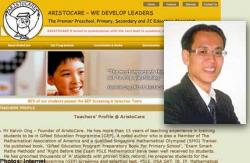Search the Community
Showing results for tags 'gifted'.
-
Gifted Education Programme offers deeper learning, but kids can still excel outside of it https://www.straitstimes.com/singapore/parenting-education/gifted-education-programme-a-differentiated-curriculum-but-smart-kids-can-still-excel-even-if-they-don-t-get-into-it SINGAPORE – Primary 3 pupils will find out this week if they have been selected for the Gifted Education Programme (GEP). With about 1 per cent of the cohort entering the GEP each year – ranging from 370 to 400 pupils, depending on the cohort size – this might mean disappointment for a number of children. But experienced educators say the three-year programme – started in 1984 for intellectually gifted Primary 4 to 6 pupils – is designed for that small group of youngsters who will thrive in it. Pupils are selected for the GEP through a two-stage process: a screening exercise comprising English and mathematics tests, and a selection exercise comprising English, maths and general ability tests. The English and maths tests assess students on concepts taught in the syllabus from Primary 1 to 3, while the general ability test assesses students on their logical thinking and general reasoning abilities. The GEP’s differentiated curriculum aims to nurture the depth of thinking and creative dispositions in such students. One of them is Christian Choong, 13, who taught himself the number system and how to read and write when he was three. When he started primary school, he would finish class work in less than half the given time, and was often bored in school and had trouble socialising with his peers. His father Adrian Choong, 44, guessed then that Christian could be a gifted child and hoped he would get into the GEP. Mr Choong, now a teacher and himself a former GEP student, faced similar issues when he was young and says being in the programme helped him. He adds: “I hoped my son would get into the GEP, not because it is a more prestigious programme or that the schools have better teachers, but because I believe the GEP has the teaching and learning environment that would benefit him.” He and his wife Esther Cheng, 44, a stay-at-home mum, have a younger son, Zachary, 11, who is in the mainstream programme. Mr Choong says he did not send Christian, now in Secondary 1, for any GEP preparatory classes, but got him books on logic and reasoning tests to let him try the quizzes under timed conditions at home just before he went for the selection tests. He did not want his son’s ability to be clouded by his fear of taking such examinations in an unfamiliar environment. Christian got through the two rounds of tests and entered Rosyth School’s GEP, where he enjoyed meeting pupils he shared common interests with. “He loved being with friends who were as crazy, nerdy and geeky as he was. He would have endless conversations with his classmates about obscure mathematical topics,” says Mr Choong. He adds: “Sometimes, he would feel frustrated by his work, but struggling with the schoolwork made the eventual success all the more rewarding.” What does a GEP pupil learn? The GEP curriculum is an “enriched” version of the mainstream one. It is broader and more in-depth, with opportunities for research and inquiry-based activity. Mr Matthew Ngiam, a teacher from Tao Nan School, who has been teaching children in the GEP for 15 years, says pupils are exposed to more challenging questions and concepts. “It takes a certain cognitive ability to understand the requirements of the tasks,” he adds. For example, in maths, Primary 4 pupils learn about the ancient numeration systems, such as the Roman, Egyptian and Babylonian systems. They may research into an area of interest, like graph theory, which is not taught in primary school. When learning a topic such as algebra, mainstream Primary 6 pupils may do equations with one variable, but GEP students are exposed to questions with more variables, including simultaneous and quadratic equations. Mr Ngiam says many GEP students display similar character traits – a deep knowledge of an area of interest, a high level of curiosity, an excellent memory and an intense focus when they work on something they are passionate about. He adds that he has learnt to be flexible in his thinking as his GEP pupils offer perspectives that he has never come across. “When I go into class, I have to prepare myself that teaching is not going to be ‘one direction’. I’m the teacher, but they could end up being the ones teaching me,” he says. Apart from being able to comprehend abstract thinking, they can gather information from everywhere to synthesise something new, he says. “They go deeper than what is required in the GEP curriculum,” he adds. Likewise, for English, while the basics like grammar and vocabulary are covered, much of English lessons is literature, where pupils are introduced to various literary genres such as mysteries, fairy tales and historical fiction. Lessons are filled with discussions, where students make interdisciplinary and real-life connections, says Mrs Elaine Chong, head of the GEP at Raffles Girls’ Primary School, who has taught in the GEP for 22 years. “We don’t have ‘one answer to one question’. Some pupils may not be used to this approach where there is a lot of discussion. It could be unsettling for them,” she says. There is an individualised study option, where they learn basic research skills in Primary 4, such as how to gather data, and do analysis and presentations. In Primary 6, one of the text genres they study is biographies, where they analyse the values of a person and the factors for his or her success. The pupils are then tasked to come up with a biography of a family member, before they reflect on what they have learnt from the process. They are exposed to concepts such as discrimination and stereotypes, based on the texts they learn. “There is a lot of critical thinking. They may have to challenge their own thinking and learn to accept the views of others. It can be quite challenging, but they enjoy it because it involves higher-level thinking skills,” says Mrs Chong. Raedon Tan, 10, a Primary 4 GEP pupil from Tao Nan School, says while the work is harder in the GEP, he enjoys being able to explore all subjects at a deeper level, especially maths, his favourite subject. “We do a lot of open discussions, which also means that we can understand the perspectives of our peers,” he says. All GEP pupils take the same GEP assessment for English, maths, science and social studies. They will, however, take school-based assessments with their mainstream peers for mother tongue languages and higher mother tongue languages. At the end of Primary 6, they sit the same Primary School Leaving Examination as mainstream pupils. Their choices of educational pathways for secondary schools are the same as those open to mainstream pupils, such as the integrated programme or O-level track. How do you nurture a child who did not get into the GEP? High-ability learners who did not get selected for the GEP can still take up school-based enrichment programmes for upper-primary pupils, such as the Excellence 2000 (E2K) Mathematics Programme and E2K Science Programme. Schools also offer enrichment activities in both academic and non-academic areas, for example, coding, robotics and design thinking. A spokesman for the Ministry of Education says schools can nominate their high-ability learners to participate in its gifted education branch’s centrally organised programmes, such as the creative writing programme and the Primary Mathematics Project Competition, to provide them with further exposure. But parents can also do their part to nurture these high-ability children at home, says teachers. Mr Ngiam says parents should encourage the child to explore his or her areas of interest and provide opportunities for the child. “It starts from home. If the focus at home is only academic excellence or getting into the GEP, that takes away the joy of learning, which comes from a child’s curiosity-driven exploration,” he adds. By fostering a supportive and nurturing environment at home, parents are setting their child up for long-term success, says Mr Ngiam. Mrs Chong agrees, adding that parents can be the resource person for their child. For example, if a child likes writing, parents can expose him or her to different genres of books. “Be the audience for them when they write, give them feedback to encourage them. That is how you help them build on their passion. The GEP is not the only way to stretch children,” she says. Can students be trained to get into the GEP? Over the years, enrichment centres have been offering classes that claim to coach students to get into the GEP. With the programme offered in nine primary schools and with a class size of around 25 pupils, some parents view the GEP as a prestigious programme and send their children for lessons, hoping they will qualify for it. However, MOE has long cautioned parents against doing so, as it might inflate test scores and not reflect these students’ actual intellectual potential. Mr Ngiam says parents who want to send their children for prep classes should understand that the GEP is designed for children who have already demonstrated exceptional ability or aptitude in specific areas, such as an advanced knowledge of mathematical concepts. He says one concern of attending such classes is the impact on a child if he or she does not make it to the GEP. “There is the risk of your child feeling a lack of self-worth if he or she doesn’t get in,” he says. Another concern is when children, who are not naturally gifted, get into the GEP through test preparation. “The curriculum is designed based on the fact that they are naturally gifted. If they are not and come into the programme, they may find it a struggle to keep up with the pace,” says Mr Ngiam. Mrs Chong says that if kids in the GEP struggle to cope, parents may end up sending them for more tuition in order to keep up. “If they go for many enrichment lessons, they have no time for themselves or to reflect on their learning,” she says. Mr Zhou Shicai, founder of NickleBee Tutors and who was a former GEP student, says his centre does not offer GEP preparatory classes as he believes that giftedness is mostly an innate ability, and he discourages parents from sending their children to such classes. His enrichment centre offers advanced maths programmes for upper-primary pupils from both the GEP and mainstream programme. But he recently started teaching three lower-primary students with exceptional talent in maths in his personal capacity at their parents’ request. “This is not aimed at helping them get into the GEP, but rather to help them realise their full potential in maths because they already show innate talent,” he said. Mr Choong, who coached his son for the GEP tests, says it is possible to prepare to a certain extent, but parents must consider if a child will thrive in the GEP environment. “Your child can be trained to get into the GEP. But should your child be trained to get into the GEP? That is the question that parents should be asking themselves,” he says.
-
Education getting softer in Singapore and the GEP
noobcarbuyer replied to Wind30's topic in Lite & EZ
Revamping the GEP, after 40 years – What you need to know! https://www.kiasuparents.com/kiasu/article/revamping-the-gep Prime Minister Lawrence Wong announced, during the recent National Day Rally, that the Gifted Education Programme (GEP) will be discontinued in its current form, and instead is to be updated and expanded to benefit high-ability students in all Primary Schools. The main gist of the changes to the GEP would be: All Primary Schools will be equipped to identify high-ability learners and have their own school-based programmes to stretch these students in their areas of strengths and interests. Students no longer have to transfer to a school offering GEP and can continue in their current schools with their friends. Students who excel in particular subjects can attend after-school enrichment modules, about once a week, at nearby schools with their peers.ldren can mix around and feel at home with other intellectually gifted children. READ MORE : https://www.kiasuparents.com/kiasu/article/revamping-the-gep -
Hello folks.. Don't know if its good news or something more siong ahead... my kid actually got selected into GEP.. We never prepared him for this at all... we didn't even know he gone for Round 1 until he told us he needed to take Round 2 in another school. Any feedback/recommendations if this is actually beneficial for a kid? If it does, which are the recommended schools in NE area?
-
...to stop lying. http://www.asiaone.com/News/Latest%2BNews/...729-362053.html AsiaOne Sunday, Jul 29, 2012 SINGAPORE - Mr Kelvin Ong Wee Loong, the founder of AristoCare centre, charges a whopping $250 per lesson for parents of primary school students looking to clinch a place in the coveted Gifted Education Programme (GEP). GEP is a highly selective academic programme in Singapore, designed to identify the top 1 per cent of students from each academic year. On his website, the 36-year-old claimed he was previously from Clementi Town Primary before being admitted to Anglo-Chinese School's (Primary) GEP in Primary 4. He further stated that he went on to attend Anglo-Chinese Junior College and the National University of Singapore, before becoming a teacher in the GEP programme at his alma mater. However, checks by the Ministry of Education (MOE) revealed that Mr Ong was neither ever a pupil nor teacher in the programme, The Sunday Times reported (SUT) He is not even a qualified teacher, and according to ACS (Primary), not even a student of the school. MOE was alerted to the claims when SUT ran a report on parents sending children for costly tuition, where Mr Ong was featured as a highly sought after tutor. In response to the revelations, Mr Ong said it was his mother who told him that he was from the gifted programme and he could not verify it because he does not have the records from the past. [laugh] Knn, he himself dunno wan meh? What kinda lousy liar is this? He has since cleaned up his website and now claims that he was a relief teacher at ACS (Primary) from 2002 to 2003 and 'helped out' with the gifted classes. Lobang pichar still want to lie somemore. However, this too is being disputed by the ACS (Primary), which said that a check with all its long-serving teachers revealed that there was never a Kelvin Ong who taught there as a relief teacher. This is not the first time Mr Ong has faced allegations of misleading claims. Two parents have asked him to remove positive testimonials supposedly written by their children, saying that their children never wrote them. In 2010, Mr Ong also got into hot water with MOE for selling fake 2009 GEP Screening and Selection Test papers. [email protected] Who bring their children to this fark dup centre? I wonder why MOE do not shut down his centre and blacklist the liar. Should sent him to jail for fraud.



